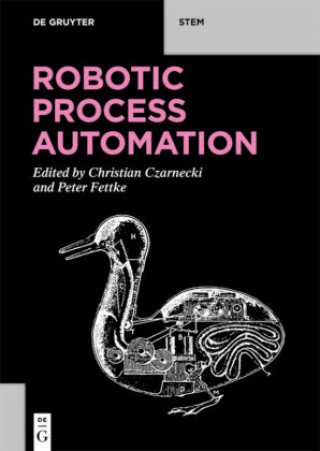
Code: 33380745
Robotic Process Automation
by Peter Fettke
This book brings together experts from research and practice. It includes the design of innovative Robot Process Automation (RPA) concepts, the discussion of related research fields (e.g., Artificial Intelligence, AI), the evaluat ... more
- Language:
 English
English - Binding: Paperback
- Number of pages: 430
Publisher: De Gruyter, 2021
- More about this

48.08 €
RRP: 59.33 €
You save 11.25 €

In stock at our supplier
Shipping in 14 - 18 days
You might also like
-
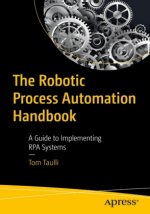
Robotic Process Automation Handbook
42.10 € -25 % -
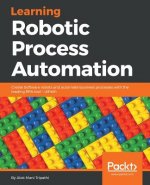
Learning Robotic Process Automation
53.53 € -
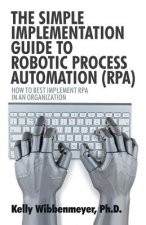
Simple Implementation Guide to Robotic Process Automation (Rpa)
11.93 € -3 % -
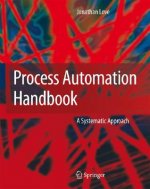
Process Automation Handbook
540.38 € -4 % -
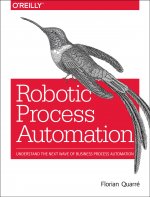
Robotic Process Automation
67.64 € -

The Pragmatic Programmer
44.99 € -4 % -

Fifth Discipline: The art and practice of the learning organization
29.34 € -18 % -

Agile practice guide
47.97 € -4 % -

In Search Of Excellence
11.63 € -14 % -
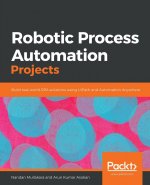
Robotic Process Automation Projects
57.04 € -

Reengineering the Corporation
15.54 € -28 % -

World is Flat
18.73 € -23 % -
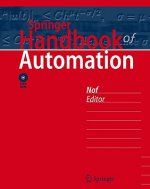
Springer Handbook of Automation
451.62 € -

Reengineering the Corporation
16.05 € -13 % -
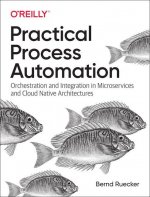
Practical Process Automation
53.33 € -21 % -
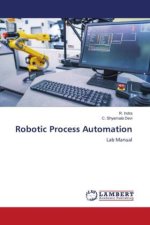
Robotic Process Automation
77.01 € -9 % -

Artificial Intelligence: A Modern Approach, Global Edition
78.87 € -

The Song of Achilles
19.97 € -23 % -

Robotic Process Automation Fundamentals for Accounting and Finance Professionals Certificate
730.26 € -

Shiba Inu Puppy Training Book for Shiba Inu Puppies By BoneUP DOG Training: Are You Ready to Bone Up? Easy Training * Fast Results Shiba Inu Puppy Tra
13.38 € -1 % -

Dingoes
9.98 € -

Outlander Volumes 5-8 (4-Book Boxed Set)
37.88 € -8 % -
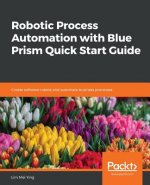
Robotic Process Automation with Blue Prism Quick Start Guide
37.06 € -
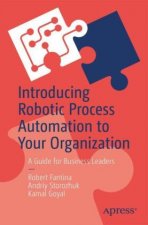
Introducing Robotic Process Automation to Your Organization
45.61 € -19 % -

Mercy
9.46 € -28 % -

Beautiful
17.80 € -18 % -

Outfoxed
7.51 € -27 % -
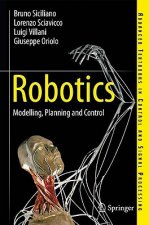
Robotics
123.66 € -

Freddie Mercury
11.52 € -21 % -

Client-Server Web Apps with JavaScript and Java
39.22 € -

Jagdgeschwader II Geschwader 'berthold'
31.40 € -
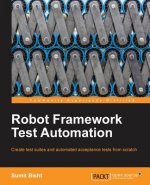
Robot Framework Test Automation
35.41 € -

Robotics and Automation Handbook
320.12 € -

Art Of Fire Emblem
45.61 € -11 % -

Building Progressive Web Apps
46.74 € -18 % -
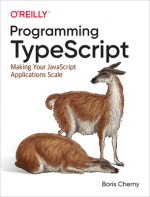
Programming TypeScript
41.69 € -27 % -

Hogyan működik a világ?
12.35 € -19 % -

NOUVELLES AVENTURES DE PAT ET MAT (LES) - DVD
23.47 € -

120 Grossglockner, Sonnblick, Kaprun, Zell am See
18.73 € -

Škola hry na kytaru pro začátečníky
11.63 € -10 % -

Tahací Beruška
5.86 € -25 % -
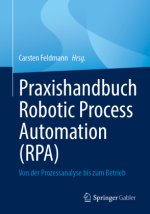
Praxishandbuch Robotic Process Automation (RPA)
56.21 € -4 %
Give this book as a present today
- Order book and choose Gift Order.
- We will send you book gift voucher at once. You can give it out to anyone.
- Book will be send to donee, nothing more to care about.
More about Robotic Process Automation
You get 118 loyalty points
 Book synopsis
Book synopsis
This book brings together experts from research and practice. It includes the design of innovative Robot Process Automation (RPA) concepts, the discussion of related research fields (e.g., Artificial Intelligence, AI), the evaluation of existing software products, and findings from real-life implementation projects. Similar to the substitution of physical work in manufacturing (blue collar automation), Robotic Process Automation tries to substitute intellectual work in office and administration processes with software robots (white-collar automation). The starting point for the development of RPA was the observation that - despite the use of process-oriented enterprise systems (such as ERP, CRM and BPM systems) - additional manual activities are still indispensable today. In the RPA approach, these manual activities are learned and automated by software robots, either by defining rules or by observing manual activities. RPA is related to business process management, machine learning, and artificial intelligence. Tools for RPA originated from dedicated stand-alone software. Today, RPA functionalities are also integrated into elaborated process management suites. From a conceptual perspective, RPA can be structured into input components (sensors in the wide sense), an intelligence center, and output components (actuators in the wide sense). From a strategic perspective, the impact of RPA can be related to the support of existing tasks, the complete substitution of human activities, and the innovation of processes as well as business models. At present, high expectations are related to the use of RPA in the improvement of software-supported business processes. Manual activities are learned and automated by software robots that interact with existing applications via the presentation layer. In combination with artificial intelligence (AI) as well as innovative interfaces (e. g., voice recognition) RPA creates a novel level of automation for office and administration processes. Its benefit potential reaches a return on investment (ROI) up-to 800% that is documented in various case studies.
 Book details
Book details
Book category Books in German Naturwissenschaften, Medizin, Informatik, Technik Informatik, EDV Informatik
48.08 €
- Full title: Robotic Process Automation
- Author: Peter Fettke
- Language:
 English
English - Binding: Paperback
- Number of pages: 430
- EAN: 9783110676686
- ISBN: 3110676680
- ID: 33380745
- Publisher: De Gruyter
- Weight: 752 g
- Dimensions: 174 × 246 × 29 mm
- Date of publishing: 10. May 2021
Trending among others
-

Python Crash Course, 3rd Edition
41.08 € -20 % -

Advanced Roblox Coding Book: An Unofficial Guide, Updated Edition
11.52 € -28 % -

The Art of Doing Science and Engineering: Learning to Learn
19.76 € -19 % -

Rust For Rustaceans
33.56 € -19 % -
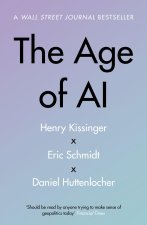
Age of AI
12.14 € -19 % -

Go Programming - From Beginner to Professional - Second Edition
48.90 € -

Brave New Words: How AI Will Revolutionize Education (and Why That's a Good Thing)
25.42 € -19 % -

Multiplayer Game Development with Unreal Engine 5: Create compelling multiplayer games with C++, Blueprints, and Unreal Engine's networking features
57.04 € -

Legend Of Final Fantasy X
30.06 € -4 % -

Agile Leadership in the Scrum context (Updated for Scrum Guide V. 2020)
39.43 € -2 % -

Applied Generative AI for Beginners: Practical Knowledge on Diffusion Models, Chatgpt, and Other Llms
57.24 € -

Learn Microservices with Spring Boot 3: A Practical Approach Using Event-Driven Architecture, Cloud-Native Patterns, and Containerization
45.71 € -18 % -

Perfect Organism
23.06 € -19 % -

The Software Engineer's Guidebook
45.30 € -

Algorithm Design Manual
68.16 € -13 % -

Engineering Management for the Rest of Us
28.31 € -3 % -

The Economy of Algorithms
13.27 € -19 % -

Deep Utopia
28 € -18 % -

The AI-Powered Product Manager: Combining Strategy and Technology
25.22 € -

Minecraft: Guide Collection 4-Book Boxed Set (Updated): Survival (Updated), Creative (Updated), Redstone (Updated), Combat
43.24 € -18 % -

Elixir in Action, Third Edition
63.21 € -
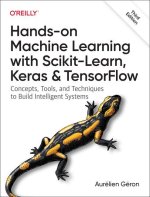
Hands-On Machine Learning with Scikit-Learn, Keras, and TensorFlow 3e
75.88 € -16 % -

Engineering Management for the Rest of Us
18.63 € -4 % -

Making of Prince of Persia
18.42 € -25 % -

The Age of AI: And Our Human Future
15.74 € -27 % -

Abenteuer Informatik
27.48 € -9 % -

Power Pivot and Power BI
24.39 € -24 % -

Docker - Up & Running
48.90 € -27 % -

Learn Microsoft Power Apps - Second Edition
54.77 € -
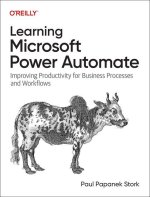
Learning Microsoft Power Automate: Improving Productivity for Business Processes and Workflows
64.35 € -21 % -

Football Analytics with Python & R: Learning Data Science Through the Lens of Sports
49.42 € -26 % -

Architecting ASP.NET Core Applications - Third Edition
57.14 € -

Making of Tomb Raider
25.73 € -28 % -

Unreal Engine Pro
35.82 € -

Practical Product Management for Product Owners
35 € -13 % -

Game Development with Blender and Godot
51.17 € -

Information Theory
35.41 € -

Adobe Photoshop Classroom in a Book 2024 Release
64.96 € -2 % -

Mastering Salesforce Reports and Dashboards: Drive Business Decisions with Your Crm Data
53.33 € -21 % -

Software Architecture Foundation: Cpsa Foundation Exam Preparation
75.88 € -
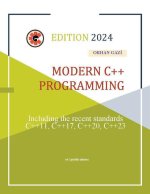
Modern C++ Programming
66.51 € -

Protocol Buffers Handbook
48.90 € -

R Packages: Organize, Test, Document, and Share Your Code
53.33 € -21 % -

Codebreaking: A Practical Guide
24.91 € -21 % -

Solutions Architect's Handbook - Third Edition
72.38 € -

Data Feminism
22.75 € -23 % -

Spring in Action
57.55 € -6 % -

Software Architecture: The Hard Parts
57.86 € -28 % -
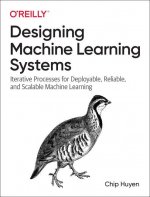
Designing Machine Learning Systems
49 € -27 %
Collection points Bratislava a 2642 dalších
Copyright ©2008-24 najlacnejsie-knihy.sk All rights reservedPrivacyCookies


 15549 collection points
15549 collection points Delivery 2.99 €
Delivery 2.99 € 02/210 210 99 (8-15.30h)
02/210 210 99 (8-15.30h)